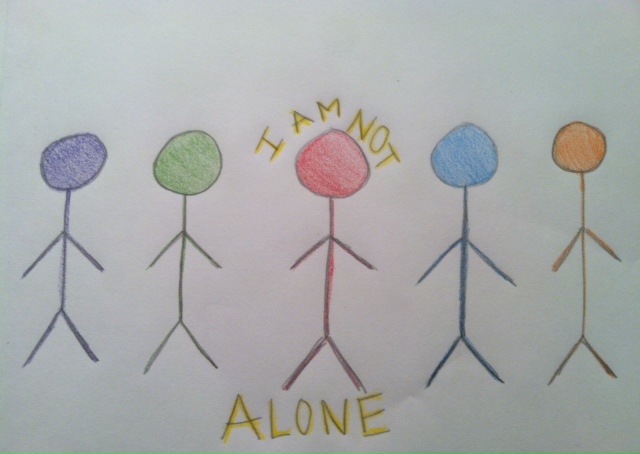In the novel The Scarlet Letter by Nathaniel Hawthorne, Hester Prynne, a young women who is tried for adultery, is sentenced to wear a red colored letter “A” upon her chest. She lives in a secluded house in the woods away from the rest of the Puritan society with her baby girl. Both Hester and her daughter are looked down upon because they are seen as sinners. I feel like everyone at some point in time has been through the same thing as Hester. We all as individuals have our own quirks and things that make us special, and we just have to learn to embrace them. Hester, regardless of her sins, stays faithful and openly bears the scarlet letter. She doesn’t ever see it as a pain or trouble; she accepts it and moves on with her life, focusing on her child and hobby of sewing.
Like Hester, writer Richard Rodriguez is isolated from society. In his essay Aria: A Memoir of a Bilingual Childhood, Rodriguez writes about being a Mexican-American immigrant going to school and growing up in a all-white neighborhood. Rodriguez described his childhood: “In this world so big, I was a foreigner.” He writes about how he felt in his community, feeling like he was an outcast for not being able to speak English. Rodriguez feels that his wasn’t truly an American citizen until he transitioned from Spanish to English, or what he calls the “public language.” He accepts that he is different from his community, but he then alters himself to fit in. Many people would consider this outrageous to conform and give up what makes you an individual, but I realized after reading this essay that this is what people today typically do. We all change ourselves and conform to what we see as “acceptable” in society, regardless of what we think of ourselves. We put on makeup to enhance our faces, we wear certain clothing to make us look more pleasing, and we act in a way that makes us seem “cool.”
In addition, nowadays many of us are fed up with social media. A lot of people use Facebook, Twitter, and Instagram as a tool to see if they “fit it” or are accepted in their group of friends. In his essay Facebook Friendonomics, Scott Brown discusses how many of us believe we have real friends, but in reality we only have cyber pals whose existence is just mere pixels through a screen. For instance, you may have a thousand friends, but in reality you probably have nine-hundred ninety-nine acquaintances. When I first made my Facebook account, I recall the reason I did so was because my mother needed a FarmVille friend to help her grow crops and unlock in-game progress. That is what the community has become: though called “social” media, we are not truly interacting with each other. We stare at a bright screen for the majority of our day in an attempt to find “happiness.” I personally believe that face-to-face communication is much more valuable than social media. I even find myself unknowingly competing with my friends to see who can gain the most Twitter followers or “likes” on Instagram. This is how media and society works: you have to have the most followers and likes to be something. How can we expect to feel content with ourselves if we keep competing with everybody around us?
I realize that I’m no different than those around me. Everyone has their flaws, and different things that make them unique. We are all individuals living in a society that expects nothing but perfection and beauty. We battle it out to see who has the greatest following on social media. We mindlessly add as many people as we can to lift our image. Yet, we neglect to realize that we are all basically the same inside. Society can be the kindest friend or the ugliest monster: it can either lift your spirits and boost your confidence, or it can break you down and diminish all the self-admiration you have. Society has the power to transform and change you into a totally different person. Many lose themselves trying to make their image seem acceptable to the rest of the world. Hester never quit being herself, she was upfront with her sin. She knows she doesn’t need to change her ways and beg her community for forgiveness. In fact, Hester’s sin is what brought her pure happiness and peace: caring for her daughter. Each of us have to take a firm hold of reality and never let go; we as individuals don’t have to change ourselves to make others happy. They only person you really need to impress is yourself.


It’s wonderful!
LikeLiked by 2 people
Yes!!! Everyone is their own individual and society is just against that. But I think that society will never be the cause of why you are changing to fit the community. It is inside your brain. You’re telling yourself that you want to change. Hester tells herself she doesn’t want to change, Taylor Swift tells herself she doesn’t want to change. You have the sole power to decide, and the community only affects that. After all, aren’t communities giant groups of like-individuals?
LikeLiked by 1 person
Your writing abilities and insight to everyday life continues to amaze me. I am so proud of the young woman you have become.
LikeLike
You did a good job integrating in points from the essays you sited. In addition, I like how you mention “Alone” as a possible interpretation for Hester’s symbol. I also enjoyed that you were unique and connected the topics with modern day examples, but I felt as if the points got muddled a bit when you started mentioning more about society and less about community. My take is that you can have a bunch of different communities that don’t need to conform in a society, especially in modern times. Overall I really enjoyed your post!
LikeLike